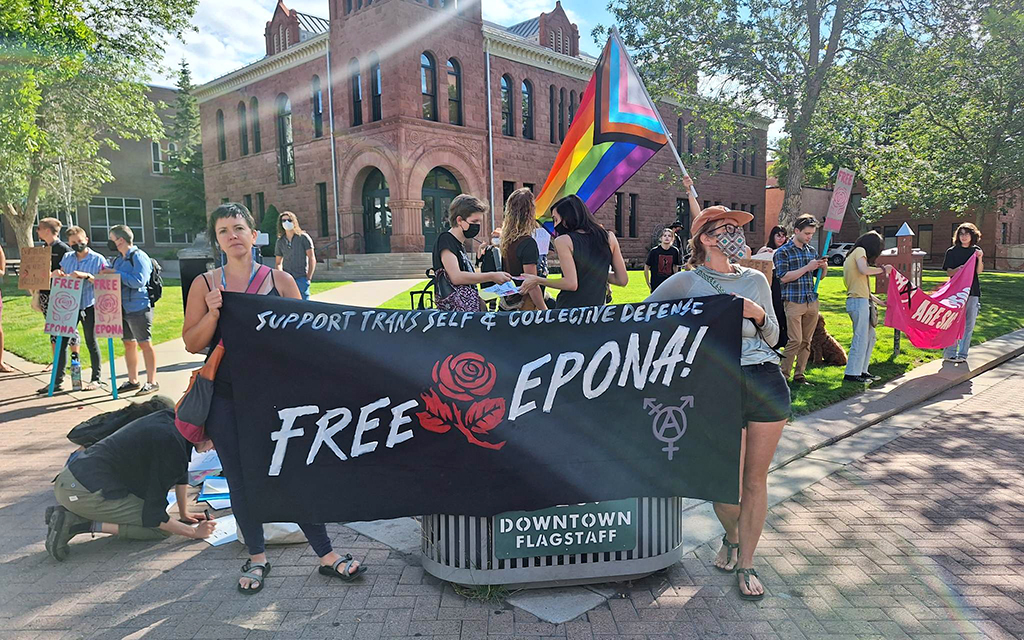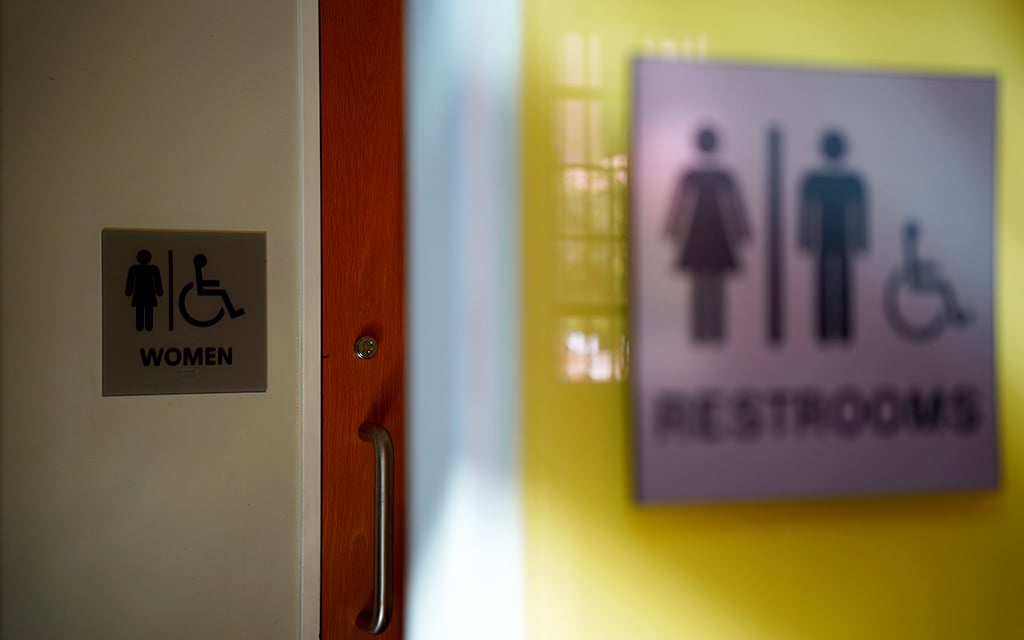
Protesters gather outside the Coconino County Courthouse last month to demand the release of Epona Rose, a transgender woman arrested and housed in a men’s jail after an altercation in downtown Flagstaff. (Photo courtesy Sumayyah Dawud)
PHOENIX – The arrest of a transgender woman last month in Flagstaff sparked protests in the community and outrage at the handling of trans cases in the criminal justice system – both during her arrest and her time in the men’s side of the jail.
Epona Rose was arrested after an altercation on Aug. 10 at Heritage Square in downtown Flagstaff. Flagstaff police officers who responded to the incident found two men injured by bear spray, and one had a knife wound on his hand, according to a police report. But Rose claims she acted in self-defense after she was attacked and sexually assaulted by four to five men who used transphobic statements, according to court documents filed by Rose’s attorney Ryan Stevens.
Stevens said Rose was housed in isolation on the men’s side of Coconino County Jail for about three weeks due to gender-segregation policies. Stevens said the situation poses questions about how the justice system handles trans, intersex and nonbinary inmates.
“That was essentially a creative solution to keep her physically safe inside the jail, but it’s not an ideal solution,” Stevens said in an interview. “An ideal solution starts with the Legislature and starts with a more realistic and progressive understanding of gender and understanding of how marginalized people are already suffering and we don’t need to make them suffer further.”
Flagstaff community members showed their support for Rose at rallies held on Aug. 17 and Aug. 28, demanding her release.
Sumayyah Dawud, a Phoenix resident and activist, heard about the rallies and Rose’s case and went to Flagstaff to protest because she had similar experiences being arrested as a trans woman during her activism.
“What Epona described in the jail doesn’t surprise me, as a trans woman, at all,” Dawud said after hearing about the case. “The kinds of things she described are pretty much what I’ve experienced in the jails, too.”
Dawud said that police and detention officers can be cruel to trans individuals being arrested or held in jails by misgendering them, making inappropriate comments or asking about the individual’s genitalia – things she experienced after she was arrested in Maricopa County.
Rose was released from jail following her arraignment hearing on Aug. 28. A grand jury had indicted her on five counts, including two counts of aggravated assault, one count of assault, one count of disorderly conduct and one count of threatening and intimidating.
Coconino County Attorney Bill Ring said the matter is still under investigation.
“There are several witnesses to be interviewed and, potentially, alternative versions of the facts at hand,” Ring said in an emailed statement. “Witnesses may describe events from different perspectives and that is not unusual. In fact, it is quite common. … This case will be decided only upon the facts and the law, nothing more and nothing less.”
Rose was unavailable for comment. Her next hearing in the case is scheduled for Oct. 9, according to her attorney.
Stevens said the prosecution and the judge in the case have agreed to use Rose’s preferred name and pronouns, and have agreed to make court pleadings reflect her preferred name. However, Stevens said this is not the norm for most cases involving trans and nonbinary individuals and that it goes above and beyond what the law requires.
However, Dawud and Stevens said a lot more needs to be done to protect trans and nonbinary people from harm while being held in jail or incarcerated.
“Starting with the police on the street that make the arrests, they need to be respectful of our gender,” Dawud said. “Starting with not misgendering us, so, if they get it wrong, and somebody says, ‘I’m she, I’m her, I’m a woman,’ they should respect that, respect their pronouns, respect those types of things.”
According to a police report on the case, officers referred to Rose by a name and pronouns she no longer uses when arresting her and in written reports provided by the Flagstaff Police Department. The department declined to comment.
But Dawud said Flagstaff community members seemed to be supportive of and sympathetic to Rose’s case during the rallies.
“A number of people would come up and ask questions, and then leave with flyers because … we were handing out flyers to educate folks,” she said. “So it was generally a pretty good response.”

